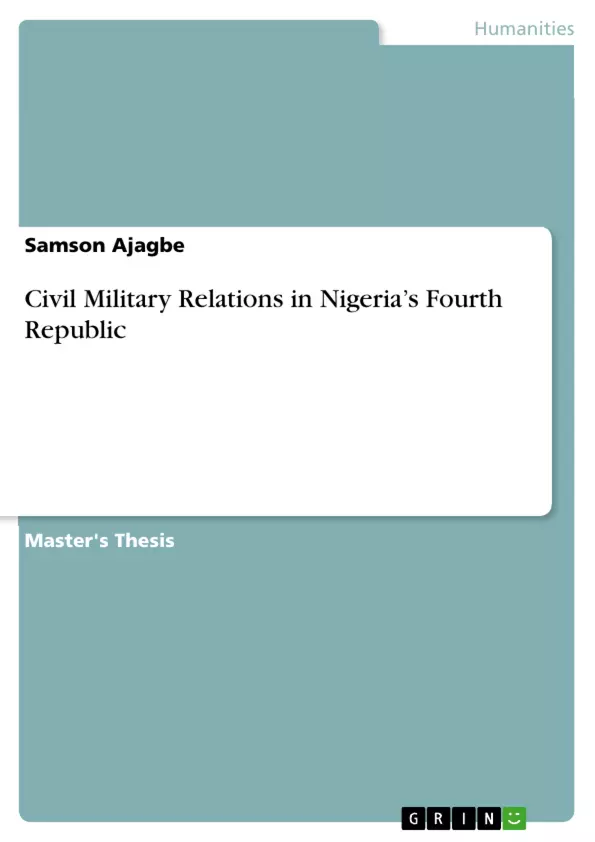The virtues of democracy being promoted by the West in most of emerging democracies are confronted by challenges which are peculiar to each of these transiting nations. The peculiarity of Nigeria’s transition lies in the improvised nature of the political system. This challenged the basic principles of democratic system. Being formerly a praetorian state, consolidation of Nigeria nascent democracy is therefore tied to the relationship between the civilian authority and military institution. This research is a study of civilmilitary relations in the context of transition and democratization. The exclusive civilian control of the armed forces in transitional democracy is empirically not suitable, particularly in Nigeria where the military still enjoys its negotiated prerogatives during the transition from authoritarian rule. The role of armed forces in the nation democratisation consequently defines their relationship with civilian authority. Issues of civil-military relations are investigated under the unique nature of the post authoritarian political patterns in Nigeria.
Table of Contents
- 1.0 Introduction
- 1.1 References
- 2.0 Theoretical Framework
- 2.1 Theory of civil military relations in transitional democracy: context and content of issues in Peter Feaver's Agency Theory
- 2.2 Conceptualizing Strategic Interaction: a core of Feaver's Agency theory
- 2.3 Methodology
- 2.4 References
- 3.0 Historical legacies of Nigerian military
- 3.1 Partisan Army- Nigerian military since 1966
- 3.2 Highlights of civil-military relations in Nigeria since independence
- 3.3 Retired military officers in politics
- 3.4 Reference
- 4.0 Civil-military behaviour
- 4.1 The military and society - a case of Nigeria
- 4.2 Validation/invalidation of research hypothesis
- 4.3 Civil-military relations in Nigeria's fourth republic
- 4.4 References
- 5.0 Summary and Conclusion
Objectives and Key Themes
This research explores the relationship between civilian authorities and the military in Nigeria during its transition to democracy. The study focuses on the challenges of consolidating democracy in a nation with a history of military intervention and a political system influenced by authoritarian rule. The research utilizes Peter Feaver's Agency Theory as a framework to analyze the dynamics of civil-military relations.
- Consolidation of democracy in Nigeria's fourth republic
- The role of the military in the democratization process
- The historical legacy of the Nigerian military and its impact on civil-military relations
- The influence of the military on civilian governance
- The interplay between civilian control and military prerogatives
Chapter Summaries
The study begins by introducing the context and objectives of the research, highlighting the unique challenges of transitioning to democracy in Nigeria. It then delves into the theoretical framework, examining Peter Feaver's Agency Theory and its application to civil-military relations in a transitional democracy. The research explores the historical legacies of the Nigerian military, particularly its involvement in politics since 1966, and analyzes the impact of retired military officers on the political landscape. Finally, the study examines the specific dynamics of civil-military relations in Nigeria's fourth republic, focusing on the interplay between civilian authority and the military institution.
Keywords
The study focuses on the key concepts of civil-military relations, transitional democracy, and the role of the military in a post-authoritarian political system. The analysis relies on the Agency Theory, a framework developed by Peter Feaver, to explain the strategic interaction between civilian and military actors. The study examines the unique challenges of democratic consolidation in Nigeria, considering the country's historical legacies of military intervention and the negotiated prerogatives of the military during the transition process. Key terms explored include democratic consolidation, civil-military relations, Agency Theory, strategic interaction, historical legacies, military intervention, and negotiated prerogatives.
- Arbeit zitieren
- Samson Ajagbe (Autor:in), 2009, Civil Military Relations in Nigeria’s Fourth Republic, München, GRIN Verlag, https://www.hausarbeiten.de/document/201214


